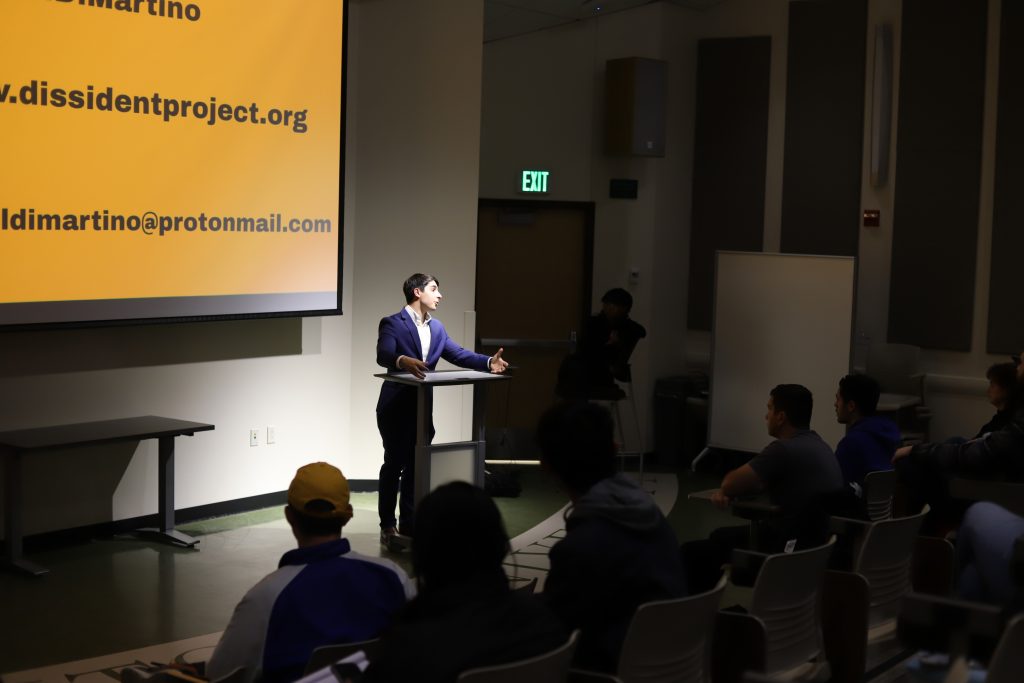Binghamton University’s College Republicans invited a guest speaker to give a lecture about socialism in Venezuela on Monday.
Daniel Di Martino, a Venezuelan native, visited BU to describe his quality of life while living in Venezuela under a socialist political order. He also refuted alleged misconceptions about socialism to paint a broader perspective for listeners. Afterwards, Di Martino introduced his vision for educating youth about socialism, which he hopes to achieve through his organization, The Dissident Project — a nonprofit organization focused on sending speakers to educate students about authoritarian regimes.
The College Republicans initially met Di Martino at a conference. Logan Blakeslee, the vice president of the College Republicans and a junior double-majoring in political science and history, explained the process of selecting Di Martino as a speaker was “very intensive.”
“We had first met Di Martino in Washington D.C. at a Young America’s Foundation (YAF) conference, and we felt that his youth and his message about socialism was applicable to the student body,” Blakeslee wrote in an email. “At that same conference, we got in touch with Di Martino and gradually arranged a time for him to visit campus.”
In attendance at Monday’s event were members of the College Republicans, various BU students and an elected official — Michael Korchak, the current Broome County district attorney. Korchak discussed his reelection campaign before Di Martino gave his lecture, titled “How Socialism Destroyed Venezuela.” The presentation outlined Di Martino’s views about differences between living in the United States and Venezuela, including access to basic necessities, like buying food at a grocery store. He blamed socialist ideas for psychologically harming the population, specifically how the country “[lost] color” as companies looked to save money.
Chance Fiorisi, the president of the College Democrats and a sophomore majoring in political science, disagreed with the overarching themes of the event. While he praised the diversity of opinion on campus, Fiorisi has a contrasting perspective on political ideology and the Venezuelan economy.
“I’m glad to see the [College Republicans] bring a speaker [onto] campus who’s views are completely [different] to my own because it gives me the opportunity to challenge this individual and those who agree with him,” Fiorisi wrote. “Venezuela’s system of socialism had many other factors leading to the quality of life there [to be] unstable. Their biggest resource, oil, is what left the country in a more disastrous state now than socialist politics.”
Later in the lecture, Di Martino also discussed the differences between Venezuela now and a couple of decades ago. He mentioned the higher standard of living and economic prosperity Venezuela had prior to socialist leaders. He then described his belief that Caracas, the capital of Venezuela, is now the most dangerous city in the world, and how the government caused inflation by printing more money.
Continuing his presentation, Di Martino addressed alleged myths about socialism and the current socioeconomic situation in Venezuela. In his presentation, he discussed the “Nordic myths,” explaining how the Nordic countries are not actually socialist and how corporations pay less taxes there than they do in the United States.
Di Martino claimed the United States’ sanctions are not at fault for damaging the Venezuelan economy.
“People like to blame the [United States], and it’s very silly,” Di Martino said. “If sanctions were powerful, we would end up like Iran. Yet there are many companies based in Miami, Houston and other cities that bring food home to home from the United States to Venezuela.”
Concluding the presentation, Di Martino introduced his nonprofit organization, The Dissident Project. Di Martino said he believes speakers who have experienced socialism firsthand can best educate the public about it.
William Anderson, a sophomore majoring in biology, was among the attendees. Drawing upon his own background, Anderson said he’s glad someone is telling the “truth” about socialist nations.
“My family is from a communist country, Laos, and [I’ve] heard all sorts of misconceptions and lies being spread about the conditions there and other communist and socialist countries,” Anderson said. “Those comments are from other American people who’ve never been there. It’s really great to be here and hear from another person actually from one of these countries to tell the truth about them.”
Reign Bey, president of the College Republicans and a senior double-majoring in computer science and Russian studies, said she hoped the event fostered new discussions on socialism.
“I think a lot of people are not educated on what socialism is,” Bey said. “I think they think it’s just social markets and social safety nets. Just educating people in that way and bringing in controversial topics to talk about is what we hope the campus gets out of this event.”



